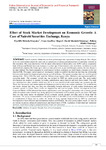| dc.description.abstract | Nairobi securities Market has not been performing to the expectation of many Kenyan. The collapse
of its two stock brokers almost the same time as caused a lot of anxiety and affected most of individual investors in
this institution. This issue interwoven with the under subscription of initial public over (LPO) such as cooperative
bank of Kenya and British American Insurance is a clear sign of deterioration in this institution. In relation to newly
industrialized countries like Asian tigers which at some point were at par with Kenyan economy but now Kenya is
far much behind. The listed companies in stock markets in these economies are much higher compares to the one
listed in NSE. This paper carried empirical investigation mainly to establish the short run and long run relationship
between stock market development and economic growth in Kenya. The annual secondary data was used for period
running from 1992 to 2011.The study used the Ordinary Least squares (OLs) Method to run regression and Error
correction model. The economic growth rate was proxied by GDP per capita growth rate. The stock market
development was assumed to measure by market capitalization, equity turnover and total shares traded .The study
also employed two other variables which were felt to be very crucial in both stock market and economic growth.
These were investment and human capital development proxied by university student enrolment. The counteraction
test results showed that there was long run relationship between indicators of stock market development and
economic growth in Kenya. These results are supported by unit root test graphs. Further investigation by Error
Correction Model (ECM) indicated that market capitalization series has negative relationship with economic growth
whilst investment series showed very strong and positive relationship with economic growth rate series. The study
finds out that stock market development affects economic growth through providing pool of cheap fund for
investment. The policy recommendation to the policy makers is that NSE is very crucial institution to be taken into
to consideration if Kenya has to realize the dream of being regional financial hub by 2030 by accelerated
development to boost domestic and international resource mobilization. The areas policy makers needs to focus on
are various incentives, enhanced competiveness and attractiveness of NSE, regulations of individual and institution
investors, stock brokers players and privatization of state own enterprises. | en_US |

